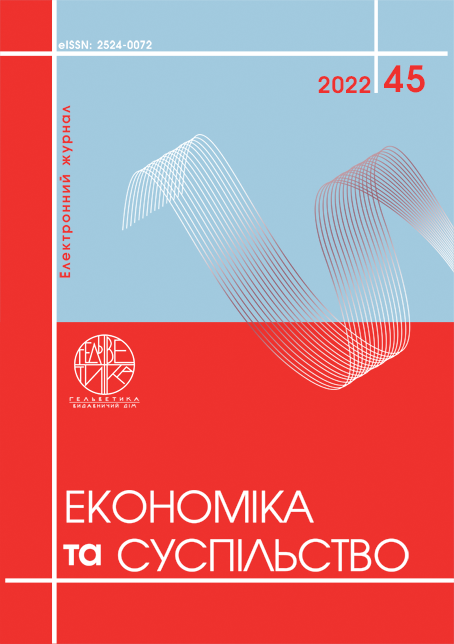MARKETING VIEW AT TERRORISM
Abstract
The article studies the philosophy of terrorism and the use of its methodology in overcoming the threats that accompany terrorism. The theoretical foundations of the formation of the ideology of terrorism are highlighted. Five waves of terrorism have been pointed out, including anarchist, anti-colonial, left-wing, religious, and terrorist Semi-States. It has been established that the basis of terrorism is violence and an attempt to intimidate those who do not support it, appealing to a sense of injustice and oppression, resorting to manipulation and justification of their violence. Based on the research, it was revealed that in modern conditions it is impossible to consider terrorism as a one-sided phenomenon, only a comprehensive, divergent approach to understanding terrorism and its ambiguous consequences can provide a positive result. In general, terrorist activities can be considered as the activities of a certain company that has a purpose and place, clear indicators that determine its achievements, corporate policy and ethics. Such an organization is characterized by its own product, its price, place of sale and promotion,that is, therotism can be considered from the point of view of the concept of marketing. The terrorist service acts as a commodity, being inherently destructive for society and beneficial for terrorists and its customers. The price in terrorism can also be viewed from different angles. On the one hand, for the followers of terrorism, the price is lifelong loyalty, sacrifice of their own lives for professing the ideology of terrorism, on the other hand, for society – certain financial and material losses, human lives and changes in values, and on the third hand – the receipt of significant amounts from terrorist activities related to illegal actions. The place of implementation of terrorist activities is most often territories with a combination of several factors, namely, poverty, lack of democratic freedoms, weak state power and the desire to usurp power by a separate group of people. In the future, they are trying to spread their influence throughout the world. Promoting their influence on the world, terrorists use a variety of tools of the communication system and the Internet, and NLP techniques, and profimming, etc. Particular attention is paid to such subjects of terrorist activity, which can be designated as stakeholders. Both the militants themselves and the states that sponsor it, as well as the sellers of weapons, can act as stakeholders of terrorism. Unfortunately, the modern world is losing in the fight against terrorism, and the use of modern information technologies allows them to move from destructive activities to gaining control over the territories they have defined. Therefore, the development of society should be directed to the creation of counterweight systems and the search for alternatives that will make terrorist activities impossible.
References
Арістова А. Релігійне підґрунтя міжнародного тероризму. URL: http://dev1.religion.in.ua. (дата звернення 27.11.2022)
Банк Р. О. Інформаційний тероризм як загроза національній безпеці України: теоретико-правовий аспект. Інформація і право. 2016. № 1. С. 110–116.
Вакулич В. М. До методології дослідження явищ тероризму і антитероризму. Вісник ХНУ імені В.Н. Каразіна. 2006. № 737. С. 152–159.
Громівчук І. М. Міжнародно-правове визначення тероризму як основа ефективної боротьби з ним. Науковий вісник Інституту міжнародних відносин НАУ. Серія: економіка, право, політологія, туризм. 2011. Т. 2. № 4. С. 108–112.
Гупта Д. К. Тероризм та політичне насильство: як їх розуміти. 2010. 400 с.
Данильченко Ю. Б. Загальна концепція детермінації тероризму. Науковий вісник Ужгородського національного університету. Серія «Право». 2016. Випуск 41. Т. 3. С. 187–190.
Данильченко Ю. Б. Система детермінант тероризму. Науковий вісник публічного та приватного права. 2016. Випуск 2. Ч. 3. С. 211–214.
Канцір В., Серкевич І. Сучасне розуміння поняття тероризму. Вісник Національного університету "Львівська політехніка". Серія : Юридичні науки. 2017. № 865. С. 449–456.
Коршунов В. О. Політичний тероризм: інформаційні методи боротьби: автореферат. Політичні інститути та процеси. 2008. 18 с.
Мороз Л. А., Чухрай Н. І. Маркетинг: підручник. 2009. 244 с.
Назаренко С. І. ЗМІ – неупереджений свідок чи мимовільний учасник терористичної діяльності? Сучасна українська політика. Політики і політологи про неї. 2010. № 19. С. 262–271.
Сидоренко О. І. Сутність та ознаки тероризму. Юридичний науковий електронний журнал. 2021. № 3. С. 294–297.
Aristova A. Relihiine pidgruntia mizhnarodnoho teroryzmu [Religious background of international terrorism]. URL: http://dev1.religion.in.ua (accesse date 27.11.2022)
Bank R. O. (2016) Informatsiinyi teroryzm yak zahroza natsionalnii bezpetsi Ukrainy: teoretyko-pravovyi aspekt. [Information terrorism as a threat to the national security of Ukraine: theoretical and legal aspect]. Informatsiia i pravo, vol. 1, pp. 110–116.
Vakulich V. M. (2006) Do metodolohii doslidzhennia yavyshch teroryzmu i antyteroryzmu [To the methodology of the study of the phenomena of terrorism and antiterrorism]. Visnyk KhNU imeni V.N. Karazina, vol. 737, pp.152–159.
Gromivchuk I. M. (2011) Mizhnarodno-pravove vyznachennia teroryzmu yak osnova efektyvnoi borotby z nym [International legal definition of terrorism as the basis for effective struggle against it]. Naukovyi visnyk Instytutu mizhnarodnykh vidnosyn NAU. Seriia: ekonomika, pravo, politolohiia, turyzm, vol. 2 № 4, pp. 108–112.
Gupta D. K. (2010) Teroryzm ta politychne nasylstvo: yak yikh rozumity [Terrorism and political violence: how to understand them]. 400 p.
Danilchenko Y. B. (2016) Zahalna kontseptsiia determinatsii teroryzmu. [General concept of determination of terrorism]. Naukovyi visnyk Uzhhorodskoho natsionalnoho universytetu. Seriia «Pravo», vol. 41(3), pp. 187–190.
Danilchenko Y. B. (2016) Systema determinant teroryzmu [System of determinants of terrorism]. Naukovyi visnyk publichnoho ta pryvatnoho prava, vol. 2(3), pp. 211–214.
Kantsir V., Serkevich I. (2017) Suchasne rozuminnia poniattia teroryzmu [Modern understanding of the concept of terrorism]. Visnyk Natsionalnoho universytetu "Lvivska politekhnika". Seriia : Yurydychni nauky, vol. 865, pp. 449–456.
Korshunov V. O. (2008) Politychnyi teroryzm: informatsiini metody borotby.n[Political terrorism: information methods of struggle]. Avtoreferat [abstract] Politychni instytuty ta protsesy. 18 p.
Moroz L. A., Chukhrai N. I. (2009) Marketynh [Marketing]. Pidruchnyk [Textbook]. 244 p.
Nazarenko S. I. (2010) ZMI – neuperedzhenyi svidok chy mymovilnyi uchasnyk terorystychnoi diialnosti? [MEDIA – an impartial witness or an involuntary participant in terrorist activities?] Suchasna ukrainska polityka. Polityky i politolohy pro nei, vol. 19, pp. 262–271.
Sydorenko O. I. (2021) Sutnist ta oznaky teroryzmu [Essence and signs of terrorism]. Yurydychnyi naukovyi elektronnyi zhurnal, vol. 3, pp. 294–297.


